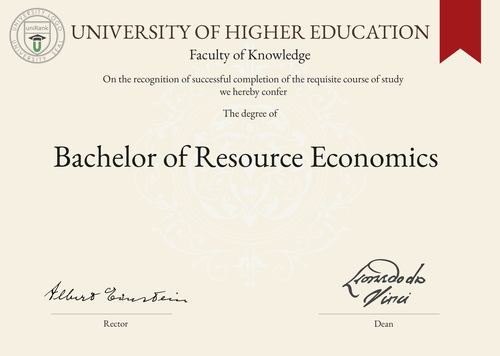
Bachelor of Resource Economics (BRE)
Guide to Bachelor of Resource Economics Program/Course/Degree
Bachelor of Resource Economics (BRE)

Degree Name:
Bachelor of Resource Economics
Degree Abbreviation:
BRE
Duration Range:
3-4 years
Tuition Range (US, UK, AUS, NZ):
$10,000-$50,000 per year
Overview:
A Bachelor of Resource Economics degree is designed to provide students with a comprehensive understanding of the economic principles that govern the management of natural resources. This degree program covers a wide range of topics, including environmental economics, resource management and sustainable development. Graduates of this program are well-equipped to pursue careers in a variety of fields, including government agencies, non-profit organizations and private industry.
Curriculum Overview by Year:
- First Year: Introduction to Microeconomics, Introduction to Macroeconomics, Calculus, Statistics, Environmental Science
- Second Year: Natural Resource Economics, Environmental Law and Policy, Econometrics, Intermediate Microeconomics, Intermediate Macroeconomics
- Third Year: Resource Management, Sustainable Development, International Trade, Public Finance, Game Theory
- Fourth Year: Advanced Resource Economics, Environmental Valuation, Energy Economics, Agricultural Economics, Capstone Project
Key Components:
- Microeconomics and Macroeconomics
- Environmental Science and Resource Management
- Econometrics and Game Theory
- Sustainable Development and Environmental Valuation
- Capstone Project
Career Prospects:
Graduates of a Bachelor of Resource Economics degree program are well-prepared to pursue careers in a variety of fields, including:
- Government agencies
- Non-profit organizations
- Private industry
- Environmental consulting firms
- Energy companies
Salary Expectations:
The salary expectations for graduates of a Bachelor of Resource Economics degree program can vary depending on the specific career path they choose. According to Payscale, the average salary for an Environmental Economist is $71,000 per year, while the average salary for a Natural Resource Manager is $63,000 per year.
For a more accurate understanding of salary expectations, you can utilize the Job Sites Search Engine, from our sister site jobRank, which searches over 4,600 job sites worldwide. Make sure to specify not only the job title but also the country you are interested in.Conclusions:
It is important to note that the duration, tuition fees, curriculum, key components, career prospects and salary expectations of a Bachelor of Resource Economics degree can vary depending on the country and university where the degree is pursued. Visitors can search for where this specific degree is offered anywhere in the world through the uniRank World Universities Search Engine.
World Universities Search Engine
search for Bachelor of Resource Economics (BRE) and add the Location (country, state etc.) or specific University you are interested in studying at.
Query examples:
- Bachelor of Resource Economics (BRE) United States
- Bachelor of Resource Economics (BRE) United Kingdom online
- Bachelor of Resource Economics (BRE) Australia international students
- Bachelor of Resource Economics (BRE) University of California
- Bachelor of Resource Economics (BRE) University of London tuition fees
- Bachelor of Resource Economics (BRE) University of Sydney scholarships
Share Program/Course
Interesting? Share this program/course/degree info with your friends now.